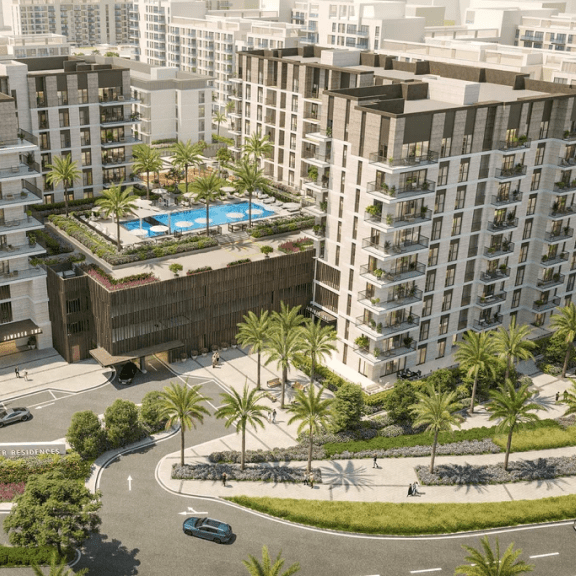Real estate in the UAE is a dream for many expats. When you don’t have enough savings to buy a home, you can get help from local banks. They offer various mortgage programme options to visitors and even non-residents of the Emirates. Admittedly, the terms and conditions for granting a mortgage to foreigners differ materially from those available to the citizens of the country. Read on to learn more about mortgages for foreigners in the UAE, the criteria imposed by banks on borrowers, and the procedure for obtaining such a loan.
Specifics of Mortgage Lending in the UAE for Expats
While the criteria for granting a mortgage to foreigners may differ at different banks in the UAE, there are some general terms:
- The maximum repayment period is 25 years.
- The minimum down payment is 20% of the value of the real estate.
- The maximum amount of a mortgage is 80% of the total purchase price (in the case of non-residents of the UAE – only up to 50%).
New buildings in the UAE
UAE credit institutions offer fixed and variable interest rates. The former usually apply to mortgages with a long lending period - from 10 years. The size of the payments will remain unchanged for the entire period. Part of the fixed amount will be used to repay the loan principal, while the other part will be used to pay the interest.
As the variable or differentiated rate is directly contingent on the key rate, it changes during the repayment period. This rate accrues on the balance of the loan principal, in other words, payments become smaller as and when the loan is repaid. A mortgage tends to have a variable interest rate if the period does not exceed 10 years. In both cases, the interest rate fluctuates from 3% to 7% per annum.
A property acquired with a mortgage must comply with several criteria:
- The real estate must be located in a so-called freehold area. Foreigners can only buy real estate in these areas and subsequently dispose of it at their discretion: gift, let, sell, bequeath or exchange. The list of freehold areas in Dubai includes Palm Jumeirah, Downtown and many more. You can study the entire list here.
- If an expat intends to buy an off-plan property on a mortgage, it must be completed within no more than two years.
Photo: Kate Trysh (Unsplash)
Basic Criteria Imposed on Borrowers
UAE banks impose fairly stringent criteria on borrowers. They may differ in various financial institutions, but the following basic criteria must be taken into account in all instances:
- Age. At the time of the application, the expat must be at least 21 years old: at some banks the expat must be at the very least 25. The mortgage must be repaid before the borrower reaches the age of 65, or 70 in the case of the self-employed. Consequently, if a 50-year-old client applies for a mortgage, they can only obtain one for 15 years.
- Verified source of income. The applicant must be an employee of a local company or do business in the Emirates. Self-employed foreigners can also get a mortgage.
- Solvency. Banks scrutinise the income of expats, and also consider the existing and future costs of all outstanding obligations. The minimum cost of living in the country is also taken into account: about USD 1,000 for each family member per month. Under the laws of the UAE, banks may only issue a mortgage if the balance of monthly income after deducting all the costs and taxes is at least 50%. .
A number of banks also check the credit history of the borrower if it is available. Credit history data is stored at the Al Etihad database. All the country’s lenders in the UAE have access to the database.
Standard Set of Documents That You Need to Apply for a Mortgage
The list of the required documents may be longer in each specific case. The standard set includes:
- completed application form
- copy of a valid passport
- copy of a resident visa
- family composition certificate (if you are relocating with your family as well)
- Emirates ID
- bank statements for the past six months
- proof of origin of the funds (salary certificate)
- sale and purchase agreement or the letter of intent for the purchase/sale of the property
Foreign documents must be translated into English or Arabic.
Each bank has the right to request additional documents from the borrower. For example, some local lenders expect applicants to provide a police clearance certificate from their home country, audit reports for the past few years (in the case of the self-employed), or a marriage certificate.
Photo: Augustine Wong (Unsplash)
How To Get A Mortgage: A Step-By-Step Guide
The procedure for buying a property in the UAE, including a mortgage, is considered one of the simplest in the world. However, foreigners may have questions and difficulties at different stages of the transaction. Ideally, a real estate agent should supervise the process. However, it is advisable to gain an understanding of the procedure beforehand.
Step 1: Choosing a Bank
First, you should study and compare the mortgage terms offered by different banks and pay special attention to the requirements on foreign borrowers, the interest rate, and the maximum amount of the mortgage. Please note that lenders usually have a list of accredited developers. It is advisable to study this in advance.
When you have chosen a suitable bank, you can start collecting the necessary documents.
We recommend contacting the representative of the lender in advance and clarifying the contents of the package of documents specifically for your case. The more information the bank receives about the forthcoming transaction, the more accurate the preliminary list of documents will be.
Step 2: Submitting Your Application to the Bank
Most banks accept documents both at their branches and online through official websites. Regardless of the selected method, you will have to complete a special application form where you indicate your passport and personal data, information about your income, place of work, etc. The set of the required documents is attached to the application.
The audit of the borrower’s data takes from three to five business days. The rejection rate is the highest at this stage. There may be different reasons: insufficient income, bad credit history, criminal record, inaccurate or incomplete information in the application. The bank sends its decision with a notification to the personal account of the applicant or by email.
If you still haven’t selected a property, the bank will give you two months to make the choice.
Step 3: Making Preliminary Agreements
After the buyer has selected a suitable home, they draw up a letter of intent with the seller. It must be submitted to the lender. The bank arranges the expert valuation of the property. It is only after receiving the report that the bank will adopt a final decision on the mortgage.
The expert valuation and final approval of the application will cost 1% of the value of the property. If the bank rejects the request, the money will be returned.
Step 4: Getting a Mortgage and Closing the Deal
After receiving a positive decision, the applicant pays a down payment and takes out insurance for the property - this is a mandatory condition. The service will cost 0.5-1% of the value of the property. After signing the mortgage agreement, the bank transfers the required amount to the seller.
After concluding the transaction, you can register title to the property with the Dubai Land Department. After registration, you will get a copy of the Title Deed. The original document will remain at the bank until the mortgage has been repaid in full. You can read more here about the various stages in the purchase of real estate in the UAE.
Photo: Belinda Fewings (Unsplash)
Mortgage Nuances for Non-Residents of the UAE
A resident visa is one of the mandatory conditions for a mortgage. Non-residents can also buy real estate with a mortgage, but have to comply with more stringent criteria, and the rejection rate is higher. The amount of the down payment in this case will equal a minimum of 50% of the value of the property. In addition, the bank has the right to request additional documents. On the other hand, you can obtain residency in the UAE through the purchase of the property.
Real estate investors can buy a property in the UAE even remotely by issuing a power of attorney to a local real estate agent. However, it is always better to see the property with your own eyes before concluding a transaction. It can take one to two months to complete the purchase of the real estate, especially with a mortgage. Therefore, we recommend that investors apply in any case for a long-term visa and not for a tourist visa. A resident visa will significantly increase the chances of obtaining a loan and improve the terms and conditions.
In a Nutshell
Expats and non-residents can take out a mortgage from a number of UAE banks: Ajman Bank, Emirates Islamic Bank, HSBC, Abu Dhabi Islamic Bank, and others. Before applying, it is important that you study the terms and conditions of the mortgage and compare the offers from different financial institutions. The decision of the bank is influenced by such factors as the age of the borrower, residency, and income level. Requirements are also imposed on the purchased property; one of the main ones is location in a freehold area.
Cover photo: PhotoHound (Unsplash)




